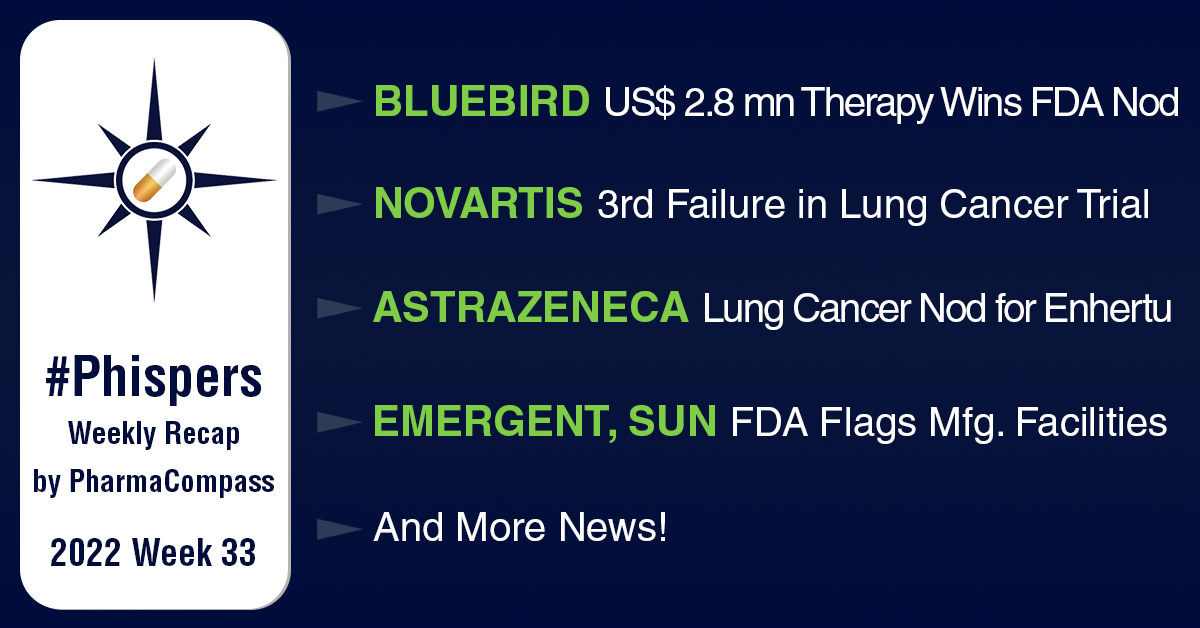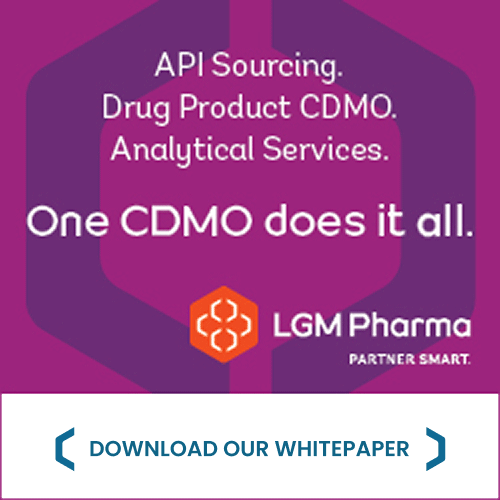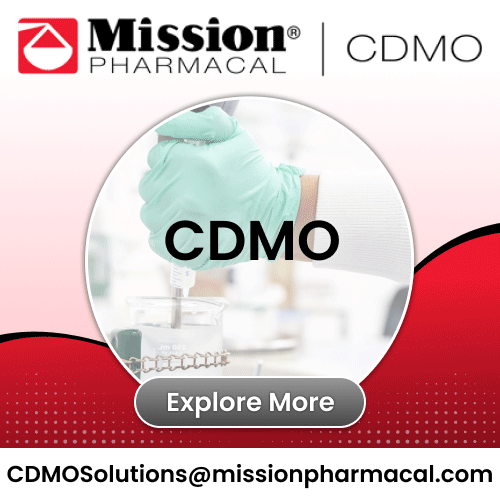
By PharmaCompass
2022-08-18
Impressions: 2,312
Just last week, the US Food and Drug Administration (FDA) had approved AstraZeneca and Daiichi Sankyo’s drug Enhertu as the first therapy to treat patients with HER2-low breast cancer. And this week, the FDA has granted Enhertu an accelerated approval to treat adults with unresectable or metastatic non-small cell lung cancer (NSCLC) whose tumors have activating HER2 (ERBB2) mutations. The agency also granted approval to Bluebird bio’s gene therapy Zynteglo to treat beta-thalassemia. With this approval, Zynteglo – priced at US$ 2.8 million – has become the world’s most expensive therapy, beating Novartis’ Zolgensma.
This week’s Phispers has news about several other drugs and clinical trials. For instance, Novartis’ blockbuster rare disease drug Ilaris (canakinumab) has once again failed a late-stage trial to treat lung cancer. Gilead’s cancer drug Trodelvy significantly improved overall survival in patients suffering from HR+/HER2- metastatic breast cancer in a late-stage trial. Sanofi has decided to stop all work on its experimental drug – amcenestrant – after an independent monitoring panel found no signs of the drug working in patients with ER-positive, HER2-negative advanced breast cancer when used in combination with Pfizer’s Ibrance. And, Pfizer has shared positive data from a late-stage trial of its 20-valent pneumococcal vaccine – Prevnar 20 – for infants.
The FDA has accepted a supplemental new drug application and granted a priority review to AstraZeneca and Merck’s cancer drug Lynparza (olaparib) in combination with abiraterone and prednisone or prednisolone for metastatic castration-resistant prostate cancer (mCRPC). It has also accepted Roche’s supplemental biologics license application (sBLA) for Polivy in combination with Rituxan as well as cyclophosphamide, doxorubicin and prednisone (R-CHP) for the treatment of patients with diffuse large B-cell lymphoma (DLBCL).
In Covid-19 news, the United Kingdom has authorized an updated version of Moderna’s vaccine that provides protection against the Omicron variant of the coronavirus. It has become the first country to green light an Omicron vaccine.
In M&A news, Merck has signed a potential US$ 3.5 billion biobucks deal with circular RNA start-up Orna Therapeutics to develop and commercialize multiple programs, including engineered circular RNA (oRNA) vaccines and therapeutics against infectious diseases and cancers.
In regulatory news, FDA has issued a warning letter to Emergent BioSolutions for deficiencies at its Camden manufacturing facility in Baltimore, Maryland. The agency has also issued a Form 483 with six observations to Sun Pharma’s manufacturing facility at Mohali (Punjab), India.
Astra’s Enhertu bags second FDA nod in a week, this time to treat lung cancer
Last week, in a landmark nod, the FDA had approved AstraZeneca and Daiichi Sankyo’s drug Enhertu as the first therapy to treat patients with HER2-low breast cancer. In less than a week, the antibody-drug conjugate has scored yet another win – Enhertu has received an accelerated approval from the FDA to treat adults with unresectable or metastatic non-small cell lung cancer (NSCLC) whose tumors have activating HER2 (ERBB2) mutations. The patients should have received a prior systemic therapy. With this approval, Enhertu has become the first drug for patients with HER2-mutant metastatic NSCLC.
Trial win for Enhertu: AstraZeneca said Enhertu has cleared a late-stage trial testing the drug against a treatment pre-determined by physicians in HER2-positive metastatic breast cancer. The 600 patients in the trial (DESTINY-Breast02) had already been treated with another therapy. The drug met the primary goal of helping patients live longer without their disease progressing. It also met the secondary goal of improving overall survival.
Bluebird bio’s US$ 2.8 million blood disorder therapy Zynteglo gets FDA approval
The FDA has approved Bluebird bio’s gene therapy Zynteglo, also known as betibeglogene autotemcel (beti-cel), as treatment for a rare blood disorder. The one-time treatment for pediatric and adult beta-thalassemia patients who require regular red blood cell transfusions will cost US$ 2.8 million – beating Novartis’ Zolgensma (priced at US$ 2.1 million) — making it the most expensive therapy on record.
The approval is based on two clinical studies in which 89 percent of the 41 patients – adults and kids with transfusion-dependent beta-thalassemia – on Zynteglo achieved transfusion independence. Beta thalassemia, a type of inherited blood disorder, causes a reduction of normal hemoglobin and red blood cells in the blood. It leads to dizziness, weakness, fatigue and bone abnormalities, among other complications. As a one-time treatment, each Zynteglo dose is created by genetically modifying a patient’s own bone marrow stem cells.
Bluebird plans to launch the therapy in the US this year. There are around 1,000 to 1,500 transfusion-dependent beta thalassemia patients in the US.
Zynteglo was approved in Europe in 2019, where it was priced at around € 1.58 million (about US$ 1.8 million). However, the company pulled the drug off the market after it did not find takers for the expensive drug.
Novartis fails a third time at repurposing its blockbuster rare disease drug Ilaris
Novartis’ long-term efforts to repurpose its blockbuster rare disease drug Ilaris (canakinumab) to treat lung cancer has come a cropper after the drug failed a late-stage trial for a third time.
Ilaris failed to meet the primary endpoint of extending disease-free survival versus placebo in a phase 3 trial, the drugmaker said. The trial tested the drug in patients who are in stages II-IIIA and IIIB for non-small cell lung cancer (NSCLC) in the adjuvant setting. Novartis plans to share the full trial findings at an upcoming medical meeting. The drug has already failed two lung cancer trials – as a chemo combo and as a frontline therapy for previously untreated metastatic patients. It is approved to treat several rare inflammatory diseases. Last year, it generated US$ 1.06 billion, a 21 percent increase over 2020 sales.
Two children die after taking Zolgensma: Two children with spinal muscular atrophy died after receiving Novartis’ gene therapy Zolgensma – a one-time treatment for the fatal disease. Both patients – in Russia and Kazakhstan – died of acute liver failure. The Swiss pharma said it plans to ask regulators, including the FDA, to update Zolgensma’s labeling to specify that fatal acute liver failure has been reported.
Sanofi stops development of breast cancer treatment after trial failure
Sanofi has stopped further work on its experimental drug, amcenestrant, which was once seen to have a huge potential against breast cancer, following the failure of a second clinical trial. The trial was testing the oral selective estrogen receptor degrader (SERD) amcenestrant in combination with Pfizer’s Ibrance as a first-line treatment in around 1,068 patients with ER-positive, HER2-negative advanced breast cancer. The trial was stopped after an independent monitoring panel found no signs of it working.
Following the failure, Sanofi has discontinued all other studies of amcenestrant. In March, Sanofi had revealed the failure of a phase 2 trial studying the drug as a monotherapy in ER-positive, HER2-negative breast cancer.
UK authorizes Moderna’s updated Spikevax as booster to protect against Omicron
The United Kingdom has authorized an updated version of Moderna’s coronavirus vaccine that provides protection against the Omicron variant. It has become the first country to green light an Omicron shot.
The UK regulatory agency – Medicines and Healthcare products Regulatory Agency (MHRA) – gave a conditional approval to the 50-µg bivalent shot known as Spikevax bivalent Original/Omicron as a booster for people over the age of 18. The vaccine is designed specifically to target the Omicron BA.1 variant, but it also protects against the original strain of the coronavirus. Moderna said an exploratory analysis has shown the shot to generate a “good immune response” against the BA.4 and BA.5 variants too.
New CFO: Moderna has appointed James Mock as its new finance chief months after the abrupt exit of former chief financial officer Jorge Gomez. Before joining Moderna, Mock was the CFO at life sciences and diagnostics company PerkinElmer. Mock will take charge on September 6. Moderna CFO David Meline will retire on the same day, but will continue to work as a consultant. On May 10, Jorge Gomez had taken over as Moderna’s CFO. He quit the very next day after his previous employer – Dentsply Sirona – disclosed an internal probe related to financial reporting.
Merck inks US$ 3.5 billion biobucks deal with Orna for circular RNA therapies
Last week, Merck had signed a potential US$ 1.1 billion research collaboration with Boston-based Cerevance to find new targets for Alzheimer’s disease. Now, it has forged a potential US$ 3.5 billion biobucks deal with circular RNA start-up Orna Therapeutics to develop and commercialize multiple programs, including engineered circular RNA (oRNA) vaccines and therapeutics against infectious diseases and cancers.
As part of the deal, Merck will pay Orna US$ 150 million upfront and up to US$ 3.5 billion in milestone payments, along with royalties on any approved products. Merck will also invest another US$ 100 million in a US$ 221 million Series B funding round. The US biotech will retain rights to its oRNA-LNP platform, which creates circular RNAs from linear RNAs through self-circularization.
Pfizer shares positive results from late-stage trial of pneumococcal vaccine for kids
Back in June, the FDA had approved Merck’s 15-valent pneumococcal vaccine Vaxneuvance for children aged six weeks to 17 years. Two months on, Pfizer has played catch-up and has come out with positive data from a late-stage trial of its 20-valent shot, Prevnar 20, for infants.
Data from the phase 3 trial showed that a month after the last dose in the four-dose series, all 20 serotypes met the co-primary objective of non-inferiority of immunoglobulin G (IgG) geometric mean concentrations. Pfizer said it plans to file its biologics license application (BLA) with the FDA for Prevnar 20’s approval by 2022-end. Three other phase 3 trials in children are underway.
Roche’s influenza drug approved in children: The FDA has approved Roche’s Xofluza to treat acute uncomplicated influenza in children aged five years and older who have had symptoms for less than 48 hours. The agency has also approved the drug to prevent influenza in the same group of children who came in contact with infected persons.
FDA issues warning letter to Emergent BioSolutions citing quality issues
The FDA has issued a warning letter to Emergent BioSolutions for deficiencies at its Camden manufacturing facility in Baltimore, Maryland. The agency has pointed out deficiencies in the systems for cleaning and maintenance of equipment to prevent contamination of drug products, specifically related to particulates from the metal trays. It has also flagged deficiencies in processes and practices surrounding aseptic processing. The agency has also asked Emergent to review and assess its quality management system and engage a consultant to go over its cGMP operations.
Form 483 to Sun Pharma: The FDA has issued a Form 483 with six observations to Sun Pharma’s manufacturing facility at Mohali in the state of Punjab, India. The agency conducted an inspection of the facility between August 3-12. Sun Pharma said it is preparing a response to the observations and plans to submit it to the FDA within the stipulated timeline.
Gilead’s Trodelvy improves survival rates in late-stage metastatic breast cancer trial
In a late-stage trial, Gilead Sciences’ cancer drug Trodelvy significantly improved overall survival in patients suffering from a certain hard-to-treat form of breast cancer. Gilead said Trodelvy showed statistically significant and clinically meaningful results in overall survival during a second interim analysis of a phase 3 trial in HR+/HER2- metastatic breast cancer patients who have received prior endocrine therapy, CDK4/6 inhibitors and two to four lines of chemo. It plans to present the data at an upcoming medical conference. The drug is already approved in the US to treat a rarer, aggressive type of breast cancer called “triple negative”.
Meanwhile, Gilead will pay Chinese biotech Everest Medicines US$ 280 million upfront for the development and commercialization rights to Trodelvy across several Asian countries including Greater China, South Korea, Singapore and Indonesia. Everest Medicines will be eligible for a potential US$ 175 million in additional payments based on the drug achieving certain regulatory and commercial goals. The companies expect their transaction to close sometime later this year.
FDA accepts application for Astra-Merck’s Lynparza to treat prostate cancer
The FDA has accepted the supplemental new drug application and granted a priority review to AstraZeneca and Merck’s cancer drug Lynparza (olaparib) in combination with abiraterone and prednisone or prednisolone for metastatic castration-resistant prostate cancer (mCRPC). The acceptance is based on a phase 3 trial in which the drug combo reduced the risk of disease progression or death by 34 percent compared to placebo. Lynparza plus abiraterone had a median progression-free survival of 24.8 months versus 16.6 months for the placebo plus abiraterone arm. The FDA has set an action date for the fourth quarter of this year.
Roche’s sBLA for Polivy accepted: The FDA has accepted Roche’s supplemental BLA for Polivy in combination with Rituxan as well as cyclophosphamide, doxorubicin and prednisone (R-CHP) for the treatment of patients with diffuse large B-cell lymphoma (DLBCL). The FDA is expected to announce its verdict by April of next year.
The PharmaCompass Newsletter – Sign Up, Stay Ahead
Feedback, help us to improve. Click here
Image Credit : Phisper Infographic by SCORR MARKETING & PharmaCompass license under CC BY 2.0
“ The article is based on the information available in public and which the author believes to be true. The author is not disseminating any information, which the author believes or knows, is confidential or in conflict with the privacy of any person. The views expressed or information supplied through this article is mere opinion and observation of the author. The author does not intend to defame, insult or, cause loss or damage to anyone, in any manner, through this article.”








